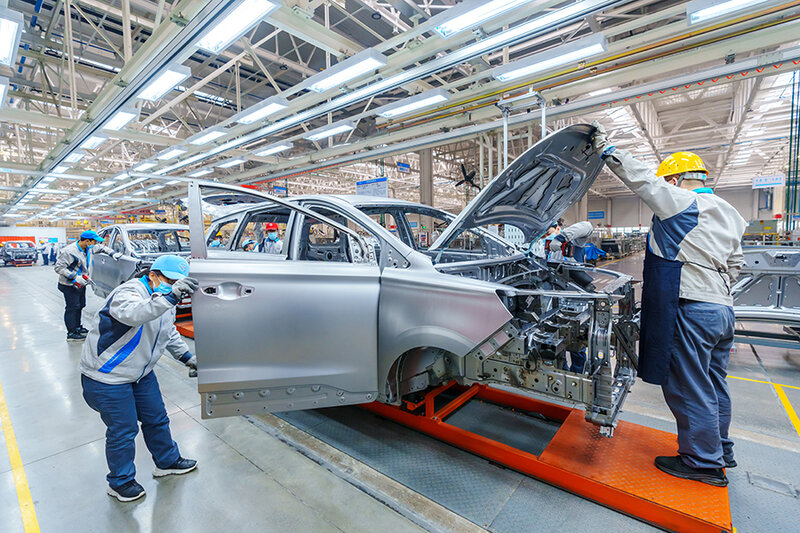Industrial firms make steady recovery

Chinas industrial enterprises saw profits rise for a third straight month in October, an official survey showed on Monday, adding to a run of indicators pointing to a stabilizing economy.
Experts said they expect to see more such indicators in the current quarter and next year as policymakers have announced a series of measures to stabilize the overall economy, prop up the property sector and boost market confidence.
They called for a more supportive fiscal policy and strengthened coordination between monetary and fiscal policies, which will help further bolster the worlds second-largest economy and defuse the risks associated with local government debt.
Their comments came as data from the National Bureau of Statistics showed on Monday that industrial enterprises with annual revenue of at least 20 million yuan ($2.8 million) each saw their total profits increase 2.7 percent year-on-year in October after a notable 11.9 percent rise in September.
Yu Weining, a statistician at the NBS, attributed the trend of continuous recovery in industrial profits to the steady rebound in industrial production and improved corporate profitability with a series of macroeconomic policies gradually taking effect.
For the January-October period, the profits of major industrial firms fell 7.8 percent year-on-year to 6.12 trillion yuan, narrowing from the 9 percent drop in the first nine months, the bureau said.
In recent months, the country has pledged a series of measures to bolster the economy, including the roval of central government bonds worth 1 trillion yuan, steps to stabilize the property market and policies to boost the private sector.
Zhou Maohua, an analyst at China Everbright Bank, said that revenues and profits of industrial enterprises both experienced growth in October, a further sign that policy support is helping the manufacturing sector recover.
"That is mainly due to the strengthened recovery of demand in the industrial goods market over the past few months, coupled with a gradual improvement in industrial product prices and the low comparison base in the previous year," he said.
Zhou said he believes that industrial profits will continue to improve, considering the anticipated economic recovery in the coming months, the improvement in industrial product sales and prices, the strong performance of the high-tech manufacturing sector and the gradual stabilization of the real estate sector.
Zheng Houcheng, chief macroeconomist at Yingda Securities, said he expects the decline in industrial profits to narrow in the first 11 months, but added that industrial profits may continue to be impacted by rising energy prices.
The latest economic data showed signs of improvement in October, with factory output and retail sales growth accelerating, while Chinas foreign trade registered year-on-year growth.
Meanwhile, Chinas consumer prices reported negative growth and factory-gate inflation remained in negative territory in October, indicating that the recovery in demand is not yet solid, the NBS data showed.
Experts said the broader economy still faces pressure from the housing correction and sluggish external demand, saying that more policy support is needed to shore up the economy.
"The key issue going forward is to stabilize the housing market," said Feng Jianlin, chief economist at Beijing FOST Economic Consulting Co.
On the demand side, he said that policymakers should promptly introduce more policies supporting peoples need for improved housing. On the supply side, the focus is on improving the financial conditions of real estate enterprises, he added.
Feng said it is advisable for the country to set an annual growth target of around 5 percent in 2024, similar to this year, which will help stabilize market expectations.
He said he expects to see a more supportive fiscal policy in the next few years. "To better drive economic growth, the focus should be placed on spending more in fields including education, healthcare, social security, eldercare and job training. And that spending will also help improve peoples livelihoods and promote consumption."
Ye Yindan, a researcher at the Bank of China Research Institute, said that fiscal policies should become more proactive and effective, playing a bigger role in stabilizing growth while expanding demand.
More efforts should also be made to optimize the structure of fiscal spending and alleviate debt burdens on local governments, she added.
声明:本文内容仅代表作者个人观点,与本站立场无关。如有内容侵犯您的合法权益,请及时与我们联系,我们将第一时间安排处理














